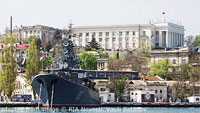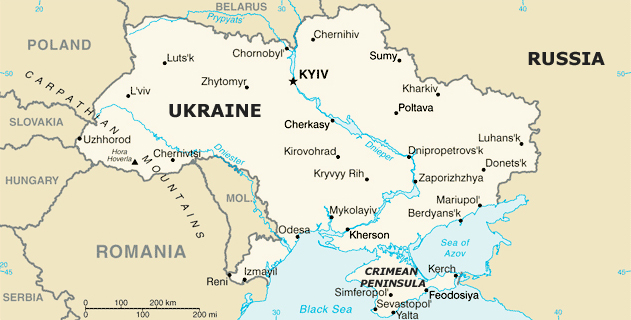Obama Warns Putin Annexing Ukraine Will Be Costly for Russia

(Business News Europe – bne.eu – Tim Ash, Standard Bank – March 13, 2014)
Pretty good summary herein of the main developments in Ukraine: [http://russialist.org/germanyeuukraine-fine-grained-response-likely-to-crimean-referendum/]
A couple of things I would add:
First the Kerry-Lavrov meeting today is important, as Kerry seemed to be playing hard to get earlier in the week, perhaps letting his Russian counterpart stew somewhat and mull over The real prospect now of sanctions and Yatseniuk’s visit to the US. The latter, no doubt, will have hardened resolve in Congress to support Ukraine, and counter perceived Russian aggression.
Second, the West seems to be nuancing its line now that sanctions will be imposed if Russia moves to annex Crimea after the weekend vote in the autonomous republic. The West has signalled anyway that whatever the outcome of that vote it will not be deemed legal or democratic. The US is offering Russia something of a hint of concessions by talk of willingness to mull over options for the future of Crimea – my sense is this would be some international committee of inquiry, but Russian troops would first have to go back to barracks, and all this would still need to be with agreement of the government in Kyiv.
Third, the US seems to be building up the pressure on Russia yesterday by releasing oil out of its strategic reserve – if there is uncertainty over the impact of Western sanctions on Russia, what is crystal clear is that lower oil prices really hurt Russia. Indeed, oil prices are the Achilles heel for the Russian economy. Twelve years ago the Russian Federal budget balanced at USD22 per barrel for oil, now it is more like USD110. And I reckon a fall in the oil price to USD80 per barrel would already cause very significant pain to the Russian economy, balance sheet and its markets. At USD80 or lower, the Russian economy would head into deep recession, the budget and current accounts would run significant deficits, capital flight would accelerate markedly depleting FX reserves and putting hefty downside pressure on the rouble. You could indeed argue that a large part of Putin’s success over the past 13-14 years has related above all else to high oil and commodity prices – he has been fortunate in this respect. If oil and commodity prices fall Russia would be heavily exposed.
Fourth, I guess a key question all around now is is Russia content with just taking and holding Crimea, and would some agreement over negotiations over the future of Crimea be enough to call Russia back from the edge. The latter might be sufficient for Russia to buy time, and head off the immediate risk of sanctions. But longer term you have to ask yourself why Russia felt the need to intervene directly in Crimea. I tend to think that this was not really over Crimea, but this was part of Putin’s strategy to deliver on the underlying agenda. The problem as I see it is that Moscow’s ultimate game plan here is to first stop Ukraine’s European integration/orientation and secondly and related therein to prevent any Maidan government from being successful – a successful Maidan poses serious risks to political stability in Russia itself as Putin fears copy cat protests at home. So whatever the outcome in Crimea, Russia is still working to a different agenda, as noted above, and how does the West counter that still. As I have long argued, ultimately a deal has to be done with Russia to ensure it does not continue to play a destructive role in Ukraine with the new Maidan administration. Where is the scope to negotiate? Well not over the form of the new government in Kyiv, or over the drive for European integration, and Ukraine’s borders cannot be redrawn, but perhaps a deal could be done over the GTS.
Fifth, perhaps one ray of hope for Ukraine is coming with this bill going through Senate – or hopefully going through Senate, over financial support for Ukraine and for increased resources for the IMF. The Obama administration has cleverly linked the two. So this is about approving the USD1bn loan guarantee for Ukraine, but potentially also increasing the Funds available to the IMF in exchange for changing IMF voting powers for EM. Potentially this could increase the size of any IMF programme for Ukraine. As of writing what has been clear is that the amount of money being spoken about in terms of emergency financial assistance for Ukraine has not really been enough – my sense is that it is a programme of around USD15bn, all in, including various non-IMF commitments. USD15bn is unlikely to be enough to fill the various holes now appearing in state finances, and the BOP. But if Senate approves the latest package, I understand that IMF support might be increased by as much as 50%, which could raise the overall support package to a level that would be a ballpark number which might make the whole thing sustainable – albeit PSI might still be required. Any IMF programme for Ukraine would still face huge challenges in terms of implementation though, and ultimately any IMF programme might still fail.

